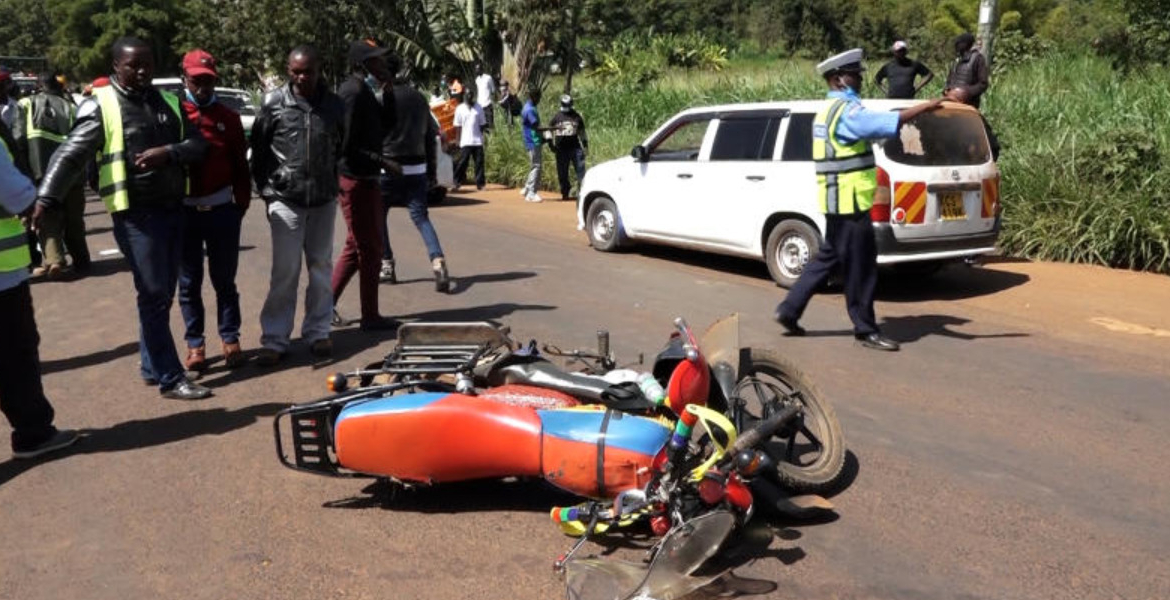Kenyan Hospitals Overwhelmed as Motorcycle Accidents Reach Crisis Levels

Kenyan hospitals are facing an unprecedented surge in motorcycle accident victims
This highlights a critical public health crisis linked to the rapid expansion and unregulated nature of the boda boda industry. With fatalities and severe injuries rising at an alarming rate, the government is under mounting pressure to implement stricter regulations and improve road safety measures. The immediate impact of the crisis is evident in hospitals across the country, where wards are increasingly occupied by victims of motorcycle accidents.
Nakuru Teaching and Referral Hospital, like many others, is struggling to cope with the influx of patients suffering from severe injuries, including broken bones and head trauma. These injuries predominantly affect young, able-bodied individuals, representing a significant loss to Kenya’s workforce and future. The statistics released by the National Transport and Safety Authority (NTSA) paint a grim picture. In the first three months of this year alone, 431 people died in motorcycle accidents, averaging five deaths per day.
Last year saw at least 1,200 riders killed, a notable increase from the 900 fatalities recorded the previous year. Authorities attribute the surge in motorcycle accidents to a combination of factors, primarily centred around reckless riding and inadequate enforcement of existing regulations. Overspeeding, inadequate training and the flouting of traffic laws are commonplace among boda boda riders.
Many operate without proper licenses, fail to wear protective gear such as helmets or reflector jackets and engage in risky behaviours such as overloading and dangerous overtaking. Rift Valley police boss Jasper Ombati notes that despite repeated appeals and law enforcement efforts, many riders remain defiant, contributing to the overwhelming number of motorcycle-related injuries and fatalities.
The abandoned motorcycles at police stations like Nakuru Central serve as stark reminders of the human cost of this crisis, with many bikes unclaimed due to the death or severe injury of their owners. In response to the escalating crisis, policymakers are working to introduce more stringent regulations aimed at streamlining the boda boda sector. The Senate Roads and Transportation Committee is currently reviewing amendments to the Public Transportation (Motorcycle Regulations) Bill, 2023, which seeks to overhaul boda boda operations.
The proposed changes include mandatory display of number plates on both the front and back of motorcycles, specific branding for public transport motorcycles, and mandatory inspections, registrations, and safety compliance checks. The bill, sponsored by Kakamega Senator Boni Khalwale, aims to treat boda bodas as public service vehicles, subjecting them to more rigorous oversight. Additionally, the legislation empowers county governments to craft localized motorcycle-related legislation that aligns with broader national safety objectives.
The NTSA and the Ministry of Transport have also been urged to amend the Traffic (Registration Plates) Rules to accommodate these reforms, ensuring that the regulatory framework is comprehensive and enforceable. The rapid growth of the boda boda sector can be traced back to 2008, when Kenya eliminated import duty on motorcycles to create employment opportunities for young people. This led to a surge in registrations, with approximately 2.5 million motorcycles registered nationwide, 1.8 million of which are actively in use.
Boda bodas have become a significant source of income for thousands of Kenyans. In urban areas like Nairobi, riders can earn between Sh2,000 and Sh3,000 daily. However, the economic benefits have been accompanied by significant risks, as the industry has largely operated without adequate oversight. Existing regulations mandating licensing, helmet use, and single-passenger policies have been poorly enforced, leading to widespread disregard for traffic laws.
Corruption and negligence have further exacerbated the dangers associated with the industry, creating a situation where the economic benefits are overshadowed by the high human cost. As Kenya grapples with the rising tide of motorcycle accidents, the future of the boda boda sector hangs in the balance. Stricter enforcement of safety measures, improved rider education, and better infrastructure are crucial to mitigating the risks associated with motorcycles.
Without urgent intervention, the country's roads may remain a perilous terrain where thousands continue to lose their lives each year. Efforts to curb reckless riding and improve oversight must be matched with investments in awareness campaigns and incentives for safer practices. The boda boda industry, while valuable, cannot thrive at the cost of human lives. As policymakers consider decisive action, they must balance the need to regulate the industry with the need to protect the livelihoods of those who depend on it.








Add new comment